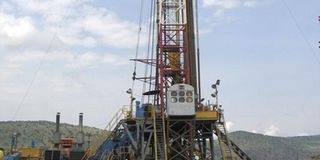Uganda returns to drawing board over government stake in oil refinery

Tullow Oil rig in western Uganda. Government has gone back to the drawing board after talks with alternate preferred oil refinery bidder, SK Energy, failed. FILE PHOTO
What you need to know:
- The SK Energy talks collapsed after the firm insisted that government increases its stake from 40 per cent to 70 per cent. The government now appears to be putting this under consideration as it talks with other investors.
- Recently, Mr Alexander Dmitrievich Polyakov, the new Russian envoy to Uganda, in an interview with Daily Monitor, noted there were failures around designing the refinery.
Kampala. Uganda’s dream to have an oil refinery appears to be so close yet so far as the government is being forced to reconsider terms of investment.
After failing to get a Russian-led consortium, RT Global Resources, to invest in the refinery in May this year, the government then opted to start talks with the alternate preferred bidder, SK Energy from South Korea. However, even on this front, the government failed to reach an agreement and the talks collapsed.
Government is currently trying to put on a brave face, noting that they have at least 20 companies interested in investing in Uganda’s oil refinery expected to cost $4b (Shs14.4 trillion).
“However, a number of companies (25) have since expressed interest in the project. The selection process with a view to selecting the most suitable partner for the project by mid-2017,” Energy minister, Ms Irene Muloni, told Parliament recently while giving an update on the developments in the oil and gas sector.
Nonetheless, Daily Monitor understands government is currently reviewing the initial terms set for the lead investor in the oil refinery. The initial investment plan by the government was to have a lead investor place at least 60 per cent equity in the oil refinery. This is, however, under consideration after several investors, including SK Energy insisted that government should have a much larger share of the equity investment.
The SK Energy talks collapsed after the firm insisted that government increases its stake from 40 per cent to 70 per cent. The government now appears to be putting this under consideration as it talks with other investors.
“We are also restructuring that project because we had 40-60 and that did not yield the desired results. One of the reasons was that government should take a higher percentage in the refinery, not 40 per cent. So we are looking to restructure this to see how the project will go ahead. The project shall be restructured accordingly depending on what is seen from expressions of interest,” Mr Dozith Abeinomugisha, the commissioner refining at the Petroleum Directorate told journalists at a recent media dialogue.
The concern right now is that the Energy ministry has to await Cabinet decision on the process of getting a new lead investor. The previous process was under open competitive bidding where the Russian-led consortium was the preferred bidder.
Daily Monitor understands that the ministry of Energy is recommending a much shorter process through direct bidding by the companies that have expressed interest in order for construction work to commence before 2018. The target is to have a refinery complete by 2020 with an initial capacity of 30,000 barrels per day, rising to 60,000 barrels per day in successive years.
The open competitive bidding is considered a much longer process that could further delay the Ugandan refinery ambition.
Failures
Recently, Mr Alexander Dmitrievich Polyakov, the new Russian envoy to Uganda, in an interview with Daily Monitor, noted there were failures around designing the refinery. He said if Russia was to come back to talks, it would be for a much smaller refinery.




